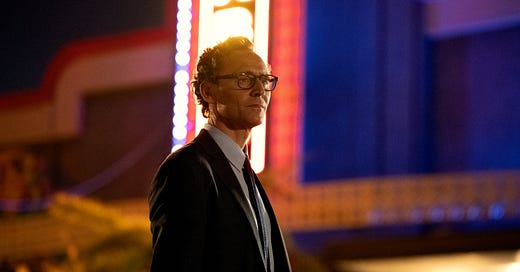‘The Life of Chuck’: Stephen King and Mike Flanagan on life, death, and the end of the world
[yes, I have again written a movie thing]
One of the ideas in The Life of Chuck is that life narrows as it rolls on, and that while the ways we don’t take or leave behind may somehow be as much a part of us as the ways we take, we do have make choices and leave things behind. In the past couple of years I’ve learned that being a high-school teacher, a university adjunct, and a film writer is too much on top of everything else—and it’s the film writing that’s gotten shortest shrift. This fall I will not be returning to teaching university. Whether that’s enough to allow regular film writing, and whether I will be able to accomplish my writing goals for this summer, remains to be seen.
From The Life of Chuck at Decent Films:
Lovingly adapted from Stephen King’s novella of the same name, The Life of Chuck was written and directed by Mike Flanagan, for whom the material is so well suited that King might as well have written it for him. Both storytellers are best known for horror, which The Life of Chuck is not, despite some eerie Twilight Zone weirdness and a locked room full of ghosts, which is the part that most feels like King wrote it for Flanagan. (Among the logos opening the film is Flanagan’s label, Red Room Pictures, named for the locked room full of ghosts in The Haunting of Hill House.) But there’s also an underlying sentimental humanism in their outputs: an effort to make sense of it all, to vindicate life as meaningful.
Tom Hiddleston plays Chuck as a man nearing the threshold of middle age, though he will never reach it. The film repeatedly recalls Carl Sagan’s Cosmic Calendar, which uses a calendar year as a metaphor for framing the scale of the history of the universe from the Big Bang to the present. In this framing, of course, it is always The End: December 31st, with the final stroke of midnight always imminent but never arriving—an implicitly apocalyptic framing. What if we instead used a calendar year to map the whole arc of the universe, ending in universal heat death? In that framing, we would likely currently be in no later than mid-February! On the other hand, if the calendar ends with the end of life on Earth, we might be in mid-November. A lot depends on the question you ask.






> Jacob Tremblay as a young adult
Jacob Tremblay? The kid from ROOM? Good grief. Time marches on, don't it?
Speaking of which, while the heat death of the universe is of course a (long!) process, not a point in time, my understanding is that star formation, allowing the possibility of planets with life, is expected to continue for at least a trillion years, which would put us in the first few days of January on a linear scale.
While I always appreciate how careful you are about spoilers, the hints about Act 2 are enough to make me feel I know roughly what to expect - though there could be a lot more to it than you've hinted at. In any case, this is definitely enticing enough to make me want to see the film, which apparently opens in my area next week. A good reminder to take advantage of movie theaters as long as we have them!